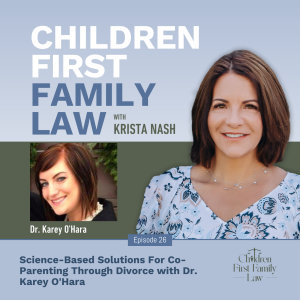
Monday Mar 31, 2025
026: Science-Based Solutions For Co-Parenting Through Divorce with Dr. Karey O'Hara
Science offers us some intriguing perspectives on divorce’s impact on children. Today’s guest is using science to better understand and support parents and kids through the complexities of the experiences of loss.
On this episode of Children First Family Law, Krista welcomes Dr. Karey O’Hara, a psychologist and assistant research professor at Arizona State University with a focus on navigating the intersection between family law and psychology. Dr. O’Hara’s work mainly focuses on how parents and children cope and adapt when exposed to significant disruptions like death and divorce. She is studying the science of how to evaluate and gauge this impact and provide solutions that can be put into practice. Dr. O’Hara’s research is always paired with active collaboration with courts or other community programs to ensure her research is tested and disseminated to real people to create real change for parents and kids. She has much to teach us in the area of risk and resilience factors associated with children’s coping and adjustment following divorce, informing family court policy, and improving interventions to promote the well-being of court-involved families.
During Krista’s conversation with Dr. O’Hara, you’ll hear about parents’ powerful influence on their children, why it is critical to validate emotions during a divorce process, and the impact high-quality parenting – including love – can have on children’s outcomes. Dr. O’Hara shares the three components of high-quality parenting, what science can teach us about interventions in the real world to help children fare better in divorce, and her research program that provides insight into understanding behavior and emotion under stress. She outlines her work in programs for parents and kids, including Project Brain Team, which promotes mental health and coping strategies and skills in divorce. Finally, Krista and Dr. O’Hara discuss lessons from science about the human and emotional experience of divorce and co-parenting dynamics and their influence on children. They share why there is hope for kids even after divorce and that those outcomes are in the hands of their parents.
Divorce is often complicated and messy, and handling those emotions can be difficult for everyone involved. However, Dr. O’Hara’s research reinforces that finding solutions that work for everyone is possible and offers some tips for reducing the tension.
In this episode, you will hear:
- Dr. Karey O’Hara’s path to her work in family law and clinical psychology focused on children and families
- The powerful influence parents have on their children
- The risk of labels like “parental alienation” and their limited helpfulness for parents and children
- Validating someone’s emotions, which can bring down the emotional temperature
- Protective factors of parents in helping themselves and their children deal with stress
- The impact of high-quality parenting (including love) on children’s outcomes
- How high-quality parenting includes love, appropriate limits, and discipline
- Risk factors for children and parents under stress
- What science can teach us about interventions in the real world to help children fare better in divorce
- Dr. O’Hara’s research program insights into understanding behavior and emotion under stress and then translating that science into ways to deliver real solutions to actual people
- Her work in programs for parents and kids, including Project Brain Team, promoting mental health and coping strategies and skills in divorce
- Lessons from science about the human, emotional experience of divorce and co-parenting dynamics and their influence on children
- Why there can be hope for children even after divorce
- The power of outcomes for kids is in the hands of their parents
Resources from this Episode
www.childrenfirstfamilylaw.com
Dr. Karey O’Hara: search.asu.edu/profile/3192762
Project Brain Team: sites.google.com/asu.edu/asu-projectbrainteam?usp=sharing
Patterns of intimate partner violence in a large, epidemiological sample of divorcing couples.
Measurement invariance across sexes in intimate partner abuse research.
All states have different laws; be sure you are checking out your state laws specifically surrounding divorce. Krista is a licensed attorney in Colorado and Wyoming but is not providing through this podcast legal advice. Please be sure to seek independent legal counsel in your area for your specific situation.
Follow and Review:
We’d love for you to follow us if you haven’t yet. Click that purple '+' in the top right corner of your Apple Podcasts app. We’d love it even more if you could drop a review or 5-star rating over on Apple Podcasts. Simply select “Ratings and Reviews” and “Write a Review” then a quick line with your favorite part of the episode. It only takes a second and it helps spread the word about the podcast.
Episode Credits
If you like this podcast and are thinking of creating your own, consider talking to my producer, Emerald City Productions. They helped me grow and produce the podcast you are listening to right now. Find out more at https://emeraldcitypro.com Let them know we sent you.
No comments yet. Be the first to say something!